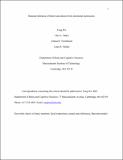Rational Inference of Beliefs and Desires From Emotional Expressions
Author(s)
Wu, Yang; Baker, Christopher Lawrence; Tenenbaum, Joshua B; Schulz, Laura E
DownloadTenenbaum_Rational Inference.pdf (16.17Mb)
OPEN_ACCESS_POLICY
Open Access Policy
Creative Commons Attribution-Noncommercial-Share Alike
Terms of use
Metadata
Show full item recordAbstract
We investigated people's ability to infer others’ mental states from their emotional reactions, manipulating whether agents wanted, expected, and caused an outcome. Participants recovered agents’ desires throughout. When the agent observed, but did not cause the outcome, participants’ ability to recover the agent's beliefs depended on the evidence they got (i.e., her reaction only to the actual outcome or to both the expected and actual outcomes; Experiments 1 and 2). When the agent caused the event, participants’ judgments also depended on the probability of the action (Experiments 3 and 4); when actions were improbable given the mental states, people failed to recover the agent's beliefs even when they saw her react to both the anticipated and actual outcomes. A Bayesian model captured human performance throughout (rs ≥ .95), consistent with the proposal that people rationally integrate information about others’ actions and emotional reactions to infer their unobservable mental states.
Date issued
2017-10Department
Massachusetts Institute of Technology. Department of Brain and Cognitive SciencesJournal
Cognitive Science
Publisher
Wiley Blackwell
Citation
Wu, Yang et al. “Rational Inference of Beliefs and Desires From Emotional Expressions.” Cognitive Science (October 2017): 1-35 © 2017 Cognitive Science Society, Inc
Version: Author's final manuscript
ISSN
0364-0213
1551-6709